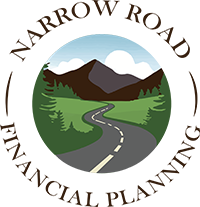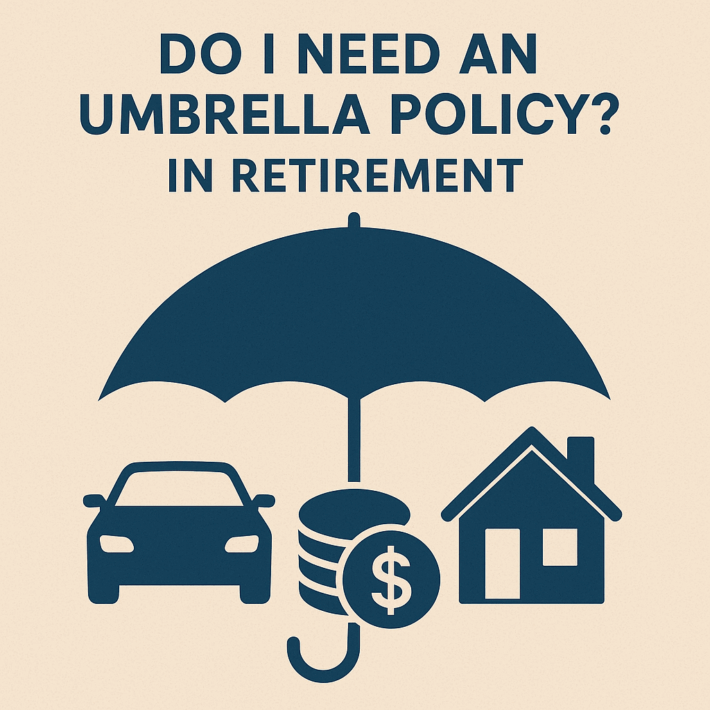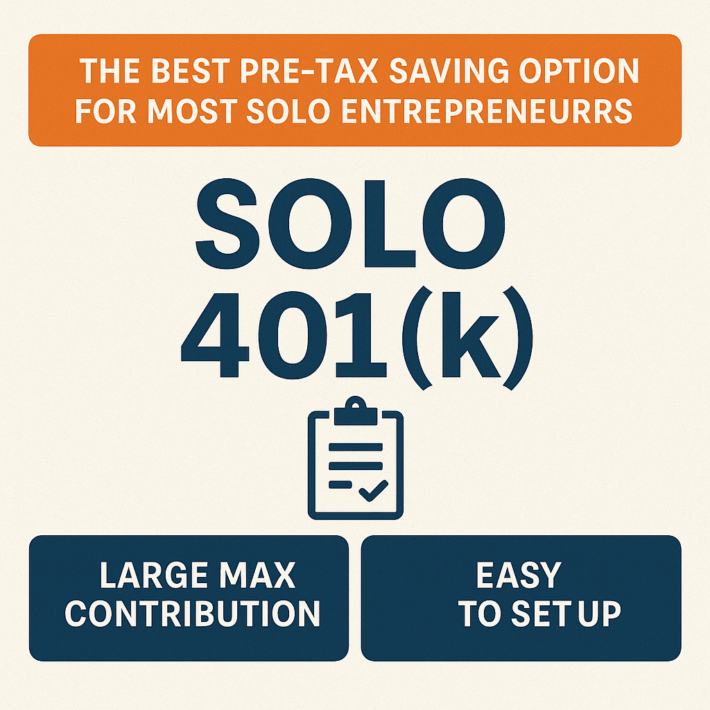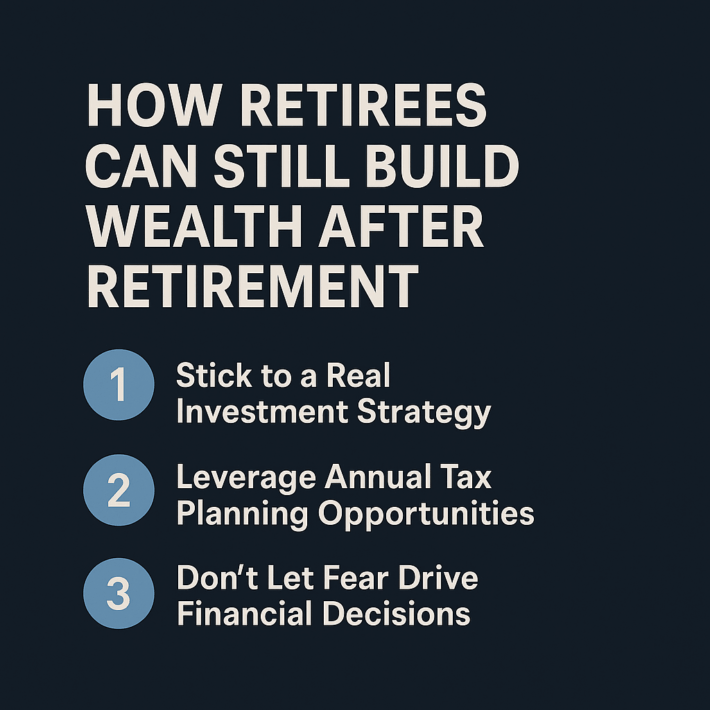7 Smart Moves to Make 6–12 Months Before Retirement
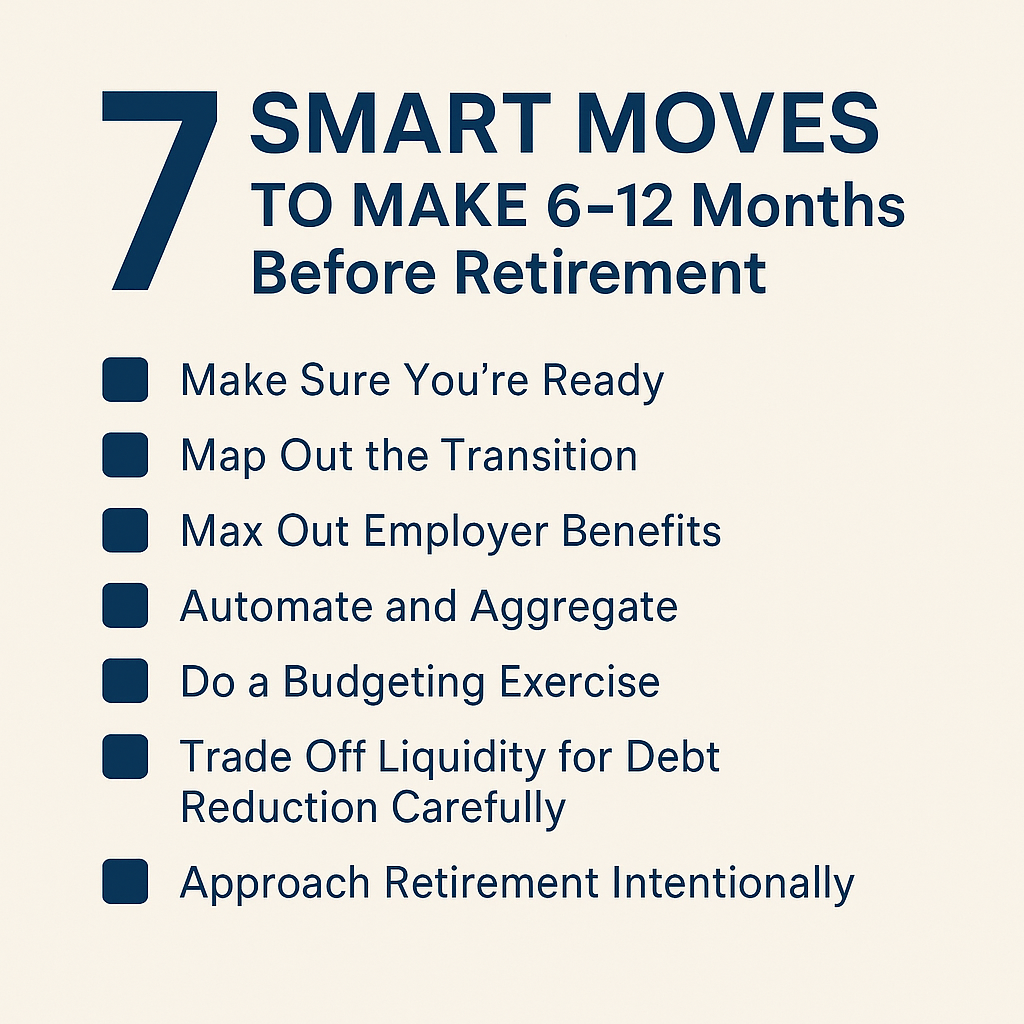
Thinking About Retiring Soon? Here’s How to Make the Most of Your Final Year at Work
If you’re 6 to 12 months away from retirement, this is your window to get strategic. Not just with your money—but with your mindset, your goals, and your game plan.
Many people enter retirement thinking it’s all about numbers: Do I have enough saved? Can I cover my expenses? While those questions matter, they’re only part of the picture. The most successful retirees prepare for more than just their bank balance—they prepare for a whole new chapter of life.
In this blog, we’ll walk through seven key moves to make before you leave the workforce. Some are financial, some are logistical, and some are deeply personal. Together, they’ll help you transition into retirement with clarity, confidence, and purpose.
Make Sure You’re Ready
Retirement planning isn’t just about numbers. Sure, we all want to know if we have enough to retire. But if you’ve ever asked yourself that question, you already know the answer isn’t just about bank balances. Everyone defines “enough” differently. That’s part of why working with a good financial planner can be so important. They help you figure out what “enough” looks like for you.
But here’s the real secret: the most overlooked part of retirement planning isn’t financial at all. It’s directional.
The retirees who struggle the most aren’t always the ones with too little money. They’re the ones who never defined what they were retiring to. Most people think about retirement in terms of escape. They’re retiring from something — bad bosses, 6 a.m. alarms, long commutes, endless Zoom meetings.
But the most fulfilled retirees? They retire to something. More time with grandkids. Starting that woodworking business. Volunteering in their community. Learning to paint. Traveling to places they’ve only seen in magazines.
Without that kind of purpose and intention, retirement can feel like meeting your childhood hero and realizing they’re kind of boring. All buildup, no payoff. That’s why it pays to take a step back and define what you want this next chapter to look like. Write it down. Talk about it. Explore it. Retirement isn’t the end of the road — it’s a new beginning.
“Study for the Exam”
Retirement is like an exam you can’t cram for. It has paperwork, deadlines, and sequencing. If you don’t lay it out in advance, you’ll be scrambling.
Start with the basics:
- When does your final paycheck land?
- Are there unused vacation or sick days that convert to cash?
- Do you need to roll over your 401(k)?
- What are the deadlines for electing your pension benefits, if applicable?
- Will you continue your health insurance through COBRA or an ACA exchange?
- When does your income replacement start — and from where?
Getting these questions answered early lets you move into retirement with clarity. It’s not just about money. It’s about starting the next chapter of your life on the right foot.
Max Out Employer Benefits Before They’re Gone
Think of your employer coverage as a closing window. Before it shuts, take advantage of everything it offers. Get your checkups and screenings. Schedule dental work you’ve been putting off. Have that vision exam.
Employer health insurance is often the most comprehensive and affordable coverage you’ll have access to. If you’re retiring mid-year, front-load contributions to your 401(k), HSA, or FSA. Once you’re off the payroll, your ability to make those contributions likely ends for the year — even if you have the cash.
You may not get another shot to make the most of those tax-advantaged tools and employer matches. So if you can, accelerate them now.
Automate and Aggregate
Now is the time to clean house. Consolidate old retirement accounts. If you have a 401(k) from every job you’ve ever held, consider rolling them into a single IRA or into your current 401(k) for simplicity. Choosing which often comes down to your unique circumstances. Update your beneficiaries on every account — not just your will.
Set up systems to automate your income stream. Social Security, pensions, investment withdrawals — the fewer manual steps, the better. Retirement should feel peaceful, not like managing a part-time job.
And keep your account naming consistent. That way, if your spouse or children ever need to step in, they won’t be left playing detective. Simplicity and visibility (in a secure way) are your new best friends.
Do a Budgeting Exercise (Yes, Really)
Many people haven’t looked at a structured budget in decades. You’ve probably spent most of your adult life thinking in terms of income, not expenses. But now the script flips. Retirement is when you transition from saving to spending. That shift can be scary.
Even retirees who have more than enough often worry about running out of money. The fear is real. And it’s rooted in uncertainty.
The antidote? Awareness.
Do a basic budgeting exercise. Nothing fancy. An Excel sheet is fine. Or try inexpensive tools like YNAB (You Need A Budget) or EveryDollar, which sync with your accounts and update automatically. Track your real spending for 2–3 months. You might be surprised by where your money actually goes.
You don’t need to budget forever. But you do need to know your baseline. It’s the foundation for a retirement income plan that works.
Trade Off Liquidity for Debt Reduction Carefully
This one trips a lot of people up.
There’s often a mad dash to eliminate all debt before retirement. And emotionally, that makes sense. You want to start fresh. But from a planning perspective, it can backfire.
Let’s say you decide to pay off your mortgage with a big chunk of cash from your taxable account. You might eliminate a monthly payment, but you’ve also drained your liquid reserves.
If an emergency comes up, where do you turn? Are you dipping into IRAs and triggering taxes? Are you selling investments in a down market?
And consider this: what’s the rate on your debt? If you refinanced your mortgage in 2020 at 2.5% and your savings account is earning 4.5%, every dollar you throw at the mortgage is locking in an opportunity cost.
That’s not an efficient use of funds.
High-interest credit card debt is a different story. That should go. But low-interest, manageable debt doesn’t have to be the enemy. The goal is to balance emotional peace of mind with financial flexibility.
Talk to a Planner Who Gets It
If you’re reading this, you already care more than most. You’re not just asking, “Do I have enough?” You’re asking, “What comes next?“
A good retirement planner helps you answer both. They coordinate the finances, of course — income, taxes, insurance, investments. But they also help you think through the rest of it: lifestyle, timing, purpose.
Retirement is a complex transition. You deserve to walk into it with a sense of peace, clarity, and anticipation.
So yes, study for the exam. Max out your benefits. Budget. Automate. Be smart about your debt.
But most of all?
Make sure you’re retiring to something.
That’s the difference between retiring and really living in retirement.
